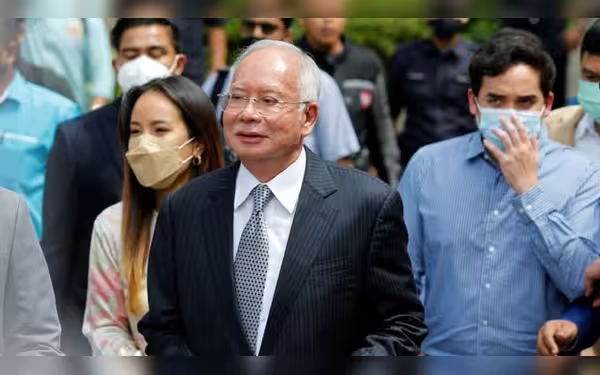Sunday, December 22, 2024 02:42 PM
Malaysia Court Drops 1MDB Charges Against Najib Razak
- Court drops charges against Najib Razak and Irwan Abdullah.
- Prosecution may recharge charges in the future.
- Najib advocates for house arrest amid ongoing legal battles.
 Image Credits: channelnewsasia
Image Credits: channelnewsasiaA Malaysian court has dropped corruption charges against Najib Razak and Irwan Abdullah linked to the 1MDB scandal, allowing future prosecution.
KUALA LUMPUR: In a significant development, a Malaysian court has decided to drop corruption charges against former Prime Minister Najib Razak and former treasury chief Irwan Serigar Abdullah. This decision comes in the wake of the infamous 1MDB scandal, which has been a major topic of discussion in Malaysia and beyond. The charges were initially filed in 2018, accusing Najib and Irwan of criminal breach of trust involving a staggering 6.6 billion ringgit (approximately US$1.48 billion) of government funds.
The funds in question were reportedly linked to a settlement agreement between 1MDB and the Abu Dhabi state fund, International Petroleum Investment Company. The Kuala Lumpur High Court granted the request for a discharge not amounting to an acquittal, primarily due to procedural delays and the prosecution's failure to provide essential documents. Najib's lawyer, Muhammad Farhan Muhammad Shafee, expressed satisfaction with the court's decision, stating, "The court correctly exercised its jurisdiction to discharge our client of the charges, consonant with the law."
A discharge not amounting to an acquittal means that while the prosecution will not pursue the charges at this moment, they retain the right to do so in the future. The judge emphasized that the prosecution could recharge Najib and Irwan, indicating that the legal battle may not be over yet. He pointed out the excessive delays in the trial process, noting, "This case was registered in 2018 but the trial cannot proceed even when trial dates have been set many times. This is an inordinate delay."
Najib, who was instrumental in the establishment of 1MDB during his tenure as Prime Minister in 2009, was previously convicted of corruption and money laundering related to the scandal. He received a 12-year prison sentence in 2022, which was later reduced by a pardon's board led by Malaysia's king. Recently, Najib expressed remorse for his involvement in the 1MDB scandal, although he continues to assert that he was unaware of any illegal activities associated with the state fund.
In a further twist, Najib has been advocating for the remainder of his sentence to be served under house arrest. He has even filed a case to compel the government to confirm the existence of a royal order that he claims would permit this arrangement. The current government, led by Anwar, has indicated plans to introduce legislation next year that would allow house arrest for certain offenses, although they have denied that this is specifically aimed at Najib or other politicians facing corruption charges.
This unfolding legal saga highlights the complexities of Malaysia's political landscape and the ongoing repercussions of the 1MDB scandal. As the situation develops, it remains to be seen how the legal system will navigate these challenges and what implications this will have for Malaysia's governance and public trust. The case serves as a reminder of the importance of accountability in leadership and the need for transparency in financial dealings, especially when public funds are at stake.













